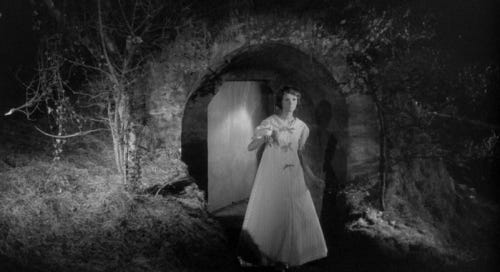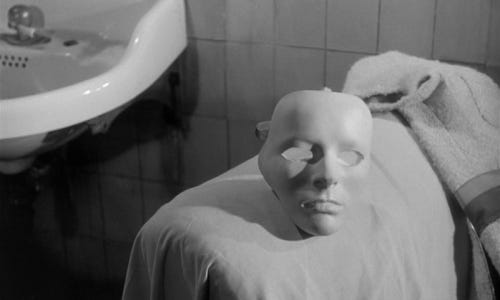I finally watched Eyes Without A Face (Les Yeux Sans Visage), the 1960 French horror movie based on the novel of the same name. It definitely wasn’t my favorite classic horror movie, but for some reason I give them a lot more credit than contemporary movies, so I still liked it. There are definitely mixed reactions to the movie when looking at the details, but I think that some of the themes and ideas it tries to explore are really interesting. As I discuss these ideas below, expect some spoilers for the movie.
I think one of the themes is the price we pay for beauty in regards to exploiting others. In order to fix Christiane’s face, her father (Dr. Génessier) and his assistant (Louise) must kill random young women that look similar enough to Christiane to transplant their face skin on to hers. Although Louise and the doctor don’t seem to feel too bad about this, the guilt weighs on Christiane. We can definitely still parallels about this in real life with the exploitation of actual people in the cosmetic industry.
One news site says “[m]any key components - from shea nuts to wax used as a base for mascara - are produced by smallholder farmers where the risk of labor abuse is high.” In one example, “Mica, a prized mineral that puts the sparkle in make-up, has been tarnished by its connection with child and forced labor in India, yet it is still widely used by cosmetics manufacturers” and illegal mining led to several deaths of children. When looking at the movie from this angle, it forces us to look at this exploitation and determine if we want to be apathetic about it like the doctor and Louise or if we want to reject it like Christiane eventually does. I’m not sure if that’s an argument that the author / director were trying to make, but it was something I noticed while watching.
Another theme I noticed was the selfish desire to fix something that doesn’t want or need to be fixed. Christiane clearly feels resentment towards her father for forcing her to go through surgery after surgery to try to fix her face, and he doesn’t really seem to consider her own feelings in the endeavor. He more so assumes how she should or would feel. It’s like a savior complex in which people feel like they’re helping someone while not listening to their actual needs. In trying to find a way to apply this to modern day, I think we can apply this to certain people’s ideas of activism. There are people that seem to have good intentions in helping marginalized groups, but then they don’t even listen to what those groups say they need from others. This gives them the allusion of helping to make them seem like good people, but they’re not actually helping in the way that the group wants to be helped. In trying to create solutions, they inadvertently create problems too.
Branching off of that, I also wished we saw more of Christiane’s perspective. I wanted to know about what she thought and felt, as she seemed to be one of the more complex characters in the movie. This could’ve added more of a statement about plastic surgery and how it can hurt patients.
One of the pieces of the movie that had the biggest impact on me while watching was how the police botched their investigation. They send this poor random girl into danger because they know she’ll agree due to some petty theft charges against her, taking advantage of her desperation. Then she’s almost killed, and they know nothing about it. There doesn’t even seem to really be any follow up with them making sure she’s okay once she runs off. I think this was probably more of a plot hole than anything, but I was still appalled at the way that poor girl was taken advantage of and ignored. Maybe this was supposed to be comedic in a way with the manner in which it’s so haphazardly managed, but it really showed how this girl was just used by the police as a pawn without much consideration for her safety.
The scene that stuck in my head the most was the final scene of Christiane emerging outside with the white birds. It was very Snow White esque. I think this image could’ve symbolized many things, such as purity, rebirth through an act of kindness (or even through absolving a prior sin), hope, or spirituality (re: absolving sins). This final scene alone improved my opinion of the movie. Something about it really spoke to me.
Finally, the last thing I took from this movie was how it reminded me a bit of the story of Frankenstein (more so the novel than movie). Both of them showcase a corrupt scientist that is obsessed with succeeding on a groundbreaking innovation. Then their creation/subject grows a deep resentment towards them and wants them dead, as Christiane ends up causing her father’s death by allowing his dogs to maul him. We, as the audience, feel sympathetic for the creation/subject, as I personally didn’t really judge her too much for her actions and felt bad for the creation when I read Frankenstein.
If you’ve seen the movie, let me know what you thought! Like I said earlier, I’m not sure if the director meant for fans to read this much into the story, but I felt like there were a lot of interesting ideas to analyze in this film. There’s definitely other ideas I didn’t touch on, but these were the ones that stuck out the most to me. It was fun to sit down and parse out my thoughts on this movie, especially since I watched it alone and didn’t have anyone to talk about it with.
ttyl,
emily






Excellent story !! Billy idol tune Rocks🤘